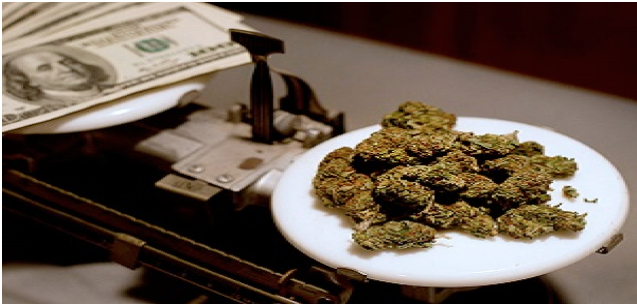CommentsCALIFORNIA ECONOMY--While most attention focused on the marijuana initiative will revolve around whether the drug should be legalized for recreational purposes, there is a discussion to be had about the tax that would be applied to marijuana if the initiative passes.
The proposal carries an excise tax of 15% above and beyond sales and use taxes imposed by state and local governments. In addition, there is a tax levied in the cultivation stage on marijuana flowers and leaves measured on a per ounce basis. According to the fiscal impact calculated for the initiative summary, the revenue generated from the marijuana tax could be hundreds of millions of dollars to over a billion dollars annually.
Most of the money is dedicated for specific purposes covering administration of the law, treating serious substance abuse, training law enforcement on applying the law, black market prevention, and providing environmental cleanup for public lands damaged by illicit marijuana trade.
Dedicating tax revenue for specific purposes is a familiar tool to get initiative measures passed but doesn’t enrich the general fund, which provides government’s basic services.
In Colorado, the first state to legalize the recreational use of marijuana, tax revenue has been dedicated to a number of purposes as well, but the main priority for the revenue is the basic government service of education. In 2015, the state raised $135 million in taxes and sent $35 million for school construction with additional revenues dedicated to other school grants.
The Tax Foundation recently reported that the Colorado collection of taxes on marijuana started slowly but exceeded expectations last year. The effective tax rate in Colorado is 29%, determined by state officials as too high to squelch black market purchases of the weed. The state will drop the tax a couple of points next year in hopes of dealing with black market sales.
This all begs the question of how the marijuana tax issue will play in the coming debate over passing or rejecting the California initiative. I suspect the tax argument will be of minor significance to voters given where the tax money is going.
Assuming those who intend to use the product and want to do so legally are willing to pay the tax, a new tax dedicated to general purposes might drum up more enthusiasm from non-users who are tired of hearing about all the tax plans floated this election season to fund basic government services.
The recent PPIC poll found support for legalizing recreational use of marijuana among likely voters, 60% to 37%. However, less than half of the adults asked (45%) said the generated tax revenue should be used as dictated by the initiative. There were no questions in the poll to determine if the money would be better spent in other areas.
With a crying need for transportation funding, for example, an argument could be made that new revenue would serve an important general purpose.
Too late for this initiative to change the ground rules if the measure passes. However, a future initiative could re-direct some or all of the marijuana tax funds.
But, first the measure has to pass and there will be opposition focused on the overriding issue of legalizing the drug.
(Joel Fox is Editor of Fox & Hounds … where this piece was first posted … and President of the Small Business Action Committee.)
Sidebar
Our mission is to promote and facilitate civic engagement and neighborhood empowerment, and to hold area government and its politicians accountable.

 CityWatch Los Angeles
Politics. Perspective. Participation.
CityWatch Los Angeles
Politics. Perspective. Participation.
01
Sun, Mar














